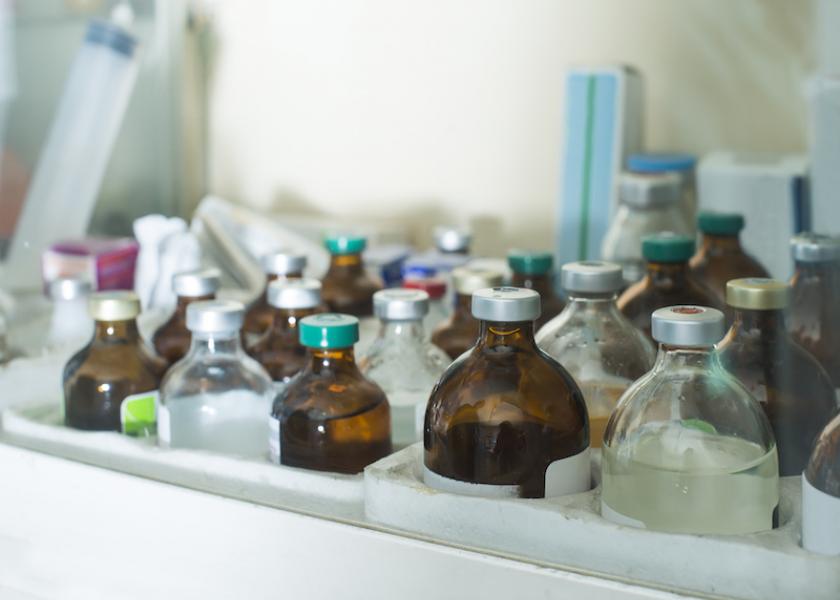Supply Chain Issues Hamper Animal Medicine Availability

Breakdowns in the global supply chain are hitting home for U.S. livestock producers and the veterinarians who serve them, in the form of shortages of commonly used medications.
In a recent Reuter’s news report, Iowa State University veterinary medicine associate professor Dr. Pat Gorden commented on the current penicillin shortage. Gorden, who currently is president of the American Association of Bovine Practitioners (AABP), said veterinarians have struggled to find even a few bottles of injectable Pen-G.
Debbie Regier, office manager for CountryAid Vet Service, Wichita, Kan., said she began noticing drug supply shortages in her routine ordering in the fall of 2020. But the situation has grown worse as the COVID-19 pandemic has worn on. Recently, she has not been able to access long-acting penicillin at all.
Other food animal veterinary drugs reported in short supply include tetracyclines, flunixin, and meloxicam. Companion animal practitioners face an even longer list of drug shortages, including pentobarbitol, a commonly used euthanasia drug for pets and horses.
To stay abreast of product supply changes, the U.S. Food and Drug Administration (FDA) maintains an ongoing database of Current Drug Shortages of medically necessary animal products. The list sometimes – but not always -- includes explanations for shortages, and notes when supply issues are resolved.
Why the shortages? In many cases, veterinary pharmaceuticals draw the short straw when drugs like penicillin are used in both people and animals. While the formulations may not be exactly the same, manufacturing of animal and human drugs often uses the same base ingredients.
Demand for human amoxicillin, for example, has risen through the COVID-19 pandemic. Raw ingredients have been diverted from the manufacturing of veterinary penicillin products to ramp up production of amoxicillin to treat sore throats and ear infections in children.
Mary van Dijk, spokesperson for Irish veterinary drug manufacturer Bimeda Inc. said a Chinese supplier of raw ingredients also recently experienced quality issues that took about six months to resolve.
Regier said her suppliers also have cited altered manufacturing processes and labor shortages as reasons for veterinary drug scarcity. In addition to drugs, she is having a tough time accessing some surgical supplies and pet foods.
And there’s another veterinary drug that has become a flashpoint in the pandemic: ivermectin. Early news reports that Australian researchers had deemed the long-used veterinary anthelmintic effective in treating COVID-19 have caused a run on the drug, leaving livestock and pet owners stranded.
The shortage owes partly to the fact that doctors have increased legal prescriptions of human ivermectin formulations. The U.S. Centers for Disease Control and Prevention recorded more than 88,000 human ivermectin prescriptions per week in August 2021, compared to a pre-pandemic baseline of 3,600.
Online forums also drove demand as people started self-medicating with ivermectin obtained through veterinary channels. A recent New York Times article cites an example of a Facebook discussion on how to dose ivermectin paste intended for horses in humans. The advice: “Put it on a cracker with a dab of peanut butter.”
The demand has spurred both price increases and shortages for livestock producers and horse owners. Over the past year, Dothan, Ala.-based animal retail supplier Jeffers has raised the price of ivermectin paste from $2.99 to $6.99 per tube. A California horse rancher was told by her supplier the ivermectin backlog was so extreme that she was 600th in line for the next batch.
In at least the short term, livestock producers and veterinarians are strategizing alternative options when the products they have traditionally used are unavailable. Regier said their veterinary practice can almost always identify an alternative treatment option, but it often comes at a higher cost to the client.
AABP president Gorden said the drug shortage has caused veterinarians to take a hard look at treatment protocols and customary practices. “In some cases, we’ve looked at alternatives to therapy or had conversations as to whether this treatment is really all the effective or needed at all,” he stated.







